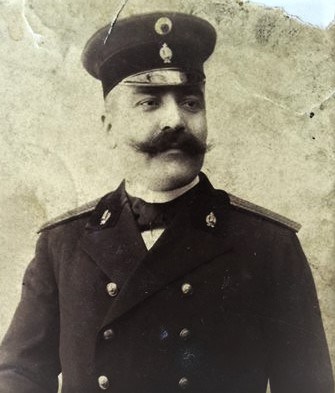Born in Armenia, Prince Nikodimos Amatuni—who appears to have been somewhat connected to the medieval princely family of the same name—developed his career in the Russian administration until the October Revolution, which ended with his emigration to France.
He was born on May 3, 1859, in the village of Oshakan, in the province of Yerevan (the burial place of Mesrop Mashtots). He studied with his father, Rev. Fr. Yesayi Amatuni, but he was not satisfied with his elementary education and left the village for Tiflis (Tbilisi), joining his relatives in the Georgian capital, who had been given title of nobility by King Irakli II of Georgia (1744-1798), renewed by Czar Nicholas I (1801-1825), and were quite influential there. He proved his kinship to his relatives of Tiflis and restored his princely title.
Nikodimos Amatuni studied and graduated from the Nersisian School. He entered the Armenian literary and cultural circles, and became friends with the famous actor Bedros Atamian (1849-1891). Later, he married Evgenia, one of the daughters of his distant relative Napoleon Amatuni (1835-1899), who was very involved in Armenian theatrical activities. Meanwhile, he went to continue his studies in St. Petersburg, where he met and befriended many important figures of the time, including Leo Tolstoy, Ivan Turgenev, Fyodor Dostoyevskiy, Maxim Gorky, and others.
He graduated from the Law School of the University of St. Petersburg in 1889 and the next year he entered the Russian administration as a member of the Criminal Committee of the Senate. In 1893 he was named prosecutor of the regional courts of Ekaterinburg. He was transferred to Saratov with the same position in 1898 and to Kamenets-Podolsk in 1903.
In the same year Amatuni was designated head of special missions at the newly-created Main Committee of Commercial Navigation and Ports. He led two naval expeditions to the Persian Gulf and surrounding areas in 1904 and 1905-1906. In 1906 he was appointed at the leadership of the Russian-Danubian Vapor Navigation Committee of the Ministry of Commerce and Industry.
In 1907 Prince Nikodimos Amatuni earned the degree of state counselor. In the years 1908-1909, he was in charge of the functioning of the river fleet of Russia. In 1910 Amatuni was designated commissar of the Russian section of the international exhibition of Turin (Italy). A year later, he received the degree of full state counselor.
He visited Armenia in 1913 and undertook the foundation of a school in his birthplace, Oshakan, becoming its main benefactor. A year later, when World War I exploded, he was designated head of the field reserves of the Red Cross in the northwestern front.
After the October Revolution, Amatuni joined the forces of General Wrangel and participated in the White movement in the south of Russia. For a short while, he was a member of the government of Southern Russia and participated in the financial and economic convention.
In the same year, after the definitive failure of the White armies and the Bolshevik triumph, Amatuni emigrated to France, where he continued his public activities and participated in the foundation of several Russian institutions, such as the Memorial Society for Empress Alexandra Feodorovna (1927), the Union of Russian Judicial Workers and the Union of Former Students of St. Petersburg University )(1935). He was a member of the Central Committee of the Russian Red Cross Society (1941–1942) and wrote his memoirs.
In his last year he lived at the Russian house of St. Genevieve du Bois, outside Paris. He passed away on March 4, 1946, and was buried at the cemetery of the town, along with many famous Russian intellectuals and military, political, and cultural figures.

